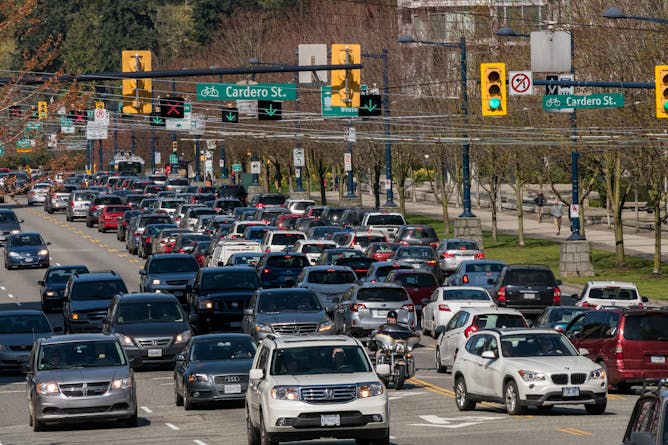|
Lost in the emotional fallout from last week’s announcement that General Motors will shut down its auto-production plant in Oshawa, Ont., was the fact that GM is planning for a day when few of us will be driving cars. Today in The Conversation Canada, Barry Cross of Queen’s University paints the not-too-distant scenario of how autonomous vehicles will change our lives and why more and more young people in North America and Europe are eschewing driving licences.
The news industry in Canada is still debating the ethical issues that have emerged from Ottawa’s recent announcement that it will offer the news media some form of financial assistance. Magda Konieczna of Temple University provides some needed context for the debate by telling us how nonprofit news organizations have prospered in the United States.
There are more refugees and people seeking asylum than ever before. Lloy Wylie of Western University says when refugees finally make it to countries like Canada, they deal with a health-care system “often ill-equipped to address their complex social and psychological needs.”
The recent midterm elections in the United States saw the highest turnout by young people within the last 25 years and that follows a similar increase in youth votes in the last Canadian federal election. Heather Ramey and Linda Rose-Krasnor of Brock University and Heather Lawford of Bishop’s University report on the growing influence of young people on politicians and policy makers.
And finally…we all saw those TV commercials the federal government ran at the time cannabis was legalized. They laid out the reasons for legalization: reducing criminal involvement in marijuana sales and to reduce the drug’s availability to young people. Andrew Hathaway of the University of Guelph says research puts both objectives in doubt and that the real reasons have more to do with market forces and politics.
A reminder we’re launching La Conversation Canada tomorrow and those of you who have signed up for our French-language newsletter will get the first edition on Wednesday morning. If you haven’t signed up yet, you can do it here.
Regards,
|

Rush hour in Vancouver, B.C. Has North America reached Peak Car?
StoneMonkeysw/Shutterstock.com
Barry Cross, Queen's University, Ontario
With car manufacturers closing down factories, and self-driving technologies improving and becoming more widely accepted, have we reached Peak Car?
|

The Guelph Mercury office in Guelph, Ont., is seen in January 2016 after the final print edition of the newspaper was published. Ottawa has announced initiatives to support local journalism, including a measure to classify nonprofit news organizations as charities, making it easier for them to attract donations.
THE CANADIAN PRESS/Hannah Yoon
Magda Konieczna, Temple University
Canada has a lot to learn from the U.S. about nonprofit news. Here's how nonprofit news organizations work in the United States. Spoiler alert: It's all about collaboration.
|

Honduran migrant Elizabeth Umanzor hugs her six-year-old daughter Gina outside the tent where their family of five is sleeping at an sports complex sheltering more than 5,000 Central American migrants in Tijuana, Mexico, Nov. 28, 2018.
(AP Photo/Rebecca Blackwell)
Lloy Wylie, Western University
Research shows that when refugees arrive in Canada they find a health system that is ill-equipped to meet their complex social and psychological needs.
|

In this Oct. 31, 2018 photo, students dance atop a bus to music during a Vote for Our Lives rally at the University of Central Florida in Orlando, Fla.
(AP Photo/John Raoux)
Heather L. Ramey, Brock University; Heather Lawford, Bishop's University; Linda Rose-Krasnor, Brock University
Young people have the right, the skills and the numbers to make a difference in politics and society in North America and beyond. Their voices, energy and vision contribute to a healthy democracy.
|

A woman smokes a large joint in a Toronto park on Wednesday, October 17, 2018, as they mark the first day of legalization of cannabis across Canada.
Lead Caption: Research shows that cannabis legalization is unlikely to either reduce criminal involvement or reduce availability to youth.
THE CANADIAN PRESS/Chris Young
Andrew Hathaway, University of Guelph
Research shows that cannabis legalization is unlikely to either reduce criminal involvement or availability to youth. Could legalization be a result of neoliberalism, or a way to woo young voters?
|
Business + Economy
|
-
Tony Walker, La Trobe University
In the wash-up of the G20 meetings, it seems China has come away with the better deal – at least for now.
|
|
Politics
|
-
Gina Yannitell Reinhardt, University of Essex
'He had the ability to make you think he was addressing you personally, even if you were one among 10,000 others.'
|
|
Environment + Energy
|
-
Christine Corlet Walker, University of Surrey
With so much attention focused on what agreements come out of COP24, protesters should be seizing the initiative to attack the root causes of climate change.
|
|